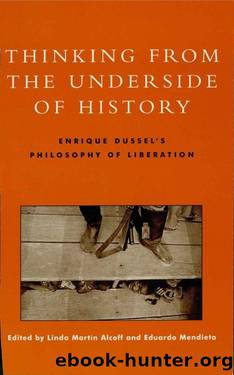Thinking from the Underside of History by Linda Alcoff & Eduardo Mendietta

Author:Linda Alcoff & Eduardo Mendietta [Alcoff, Linda]
Language: eng
Format: epub
ISBN: 9781461666677
Publisher: Rowman & Littlefield Publishers
Published: 2000-07-07T18:30:00+00:00
SUBJECT(S) OF LIBERATION THEOLOGY
In this chapter, I look at liberation theology as a current of thought and not at Dussel specifically. More than in the case of the homogeneous âpoor,â the oppressed themselves are now becoming the subjects of theology. The encounter /disencounter with the poor is constitutive for the praxis liberation theologians speak about. The option for the poor, the solidarity with the Other, is at the heart of liberation theology. Still, it is another matter when this Other announces herself or himself as a subject and wants to participate in the very definition of theology. From the point of view of the Other, she or he is no Other.3 Thus the whole discourse on solidarity with the poor and the option for them is deepened and challenged when the objects of this option become subjects. To put it bluntly, the oldest Others of Western theology have continued being Others in liberation theology as well.
Who can represent âthe people,â âthe poorâ? What do liberation theologians mean when they speak for the poor? Academic liberation theologians prefer understanding themselves as âorganic intellectualsâ in the Gramscian way. According to Juan Luis Segundo, liberation theologians have accepted being organic intellectuals, understanding their tasks to be the representation of the community, the articulation of a foundation for their intra- and extracommunal demands, and providing for them the fundamentals of a conscientization that is appropriate to their possibilities of knowledge and analysis of reality.4 âThere is no doubt that liberation theology, in its simplest and most basic forms, plays an important and, in some extraordinary cases, decisive role in satisfying these needs.â Segundo âtranslatesâ the theologianâs role into âteaching to analyze reality.â This, according to some, is a crucial shift in the role of the intellectual (theologian) from individual scholarly authority to reflective community advocate.5 Even if true, it also entails problems having to do with the question of who speaks for whom, and in what way.6
Obviously, the option for the poor and its theological, epistemological, spiritual, and political consequences can be seen as the major innovation of liberation theology. But a radical and critical question about the subject of theology goes further. The differentiation and extension of the concept âpoorâ is accepted nowadays by practically all liberation theologians. They have consciously taken âthe dominated and dependent Latin Americaâ as their starting point, but they have not been as critical of other âplacesâ that define their theologizing, such as race and gender.7 This is why the growing dialogue between different liberation theologies is so important. It does not mean weakening the basic options and innovations of liberation theology or ridiculing them. To the contrary, it means taking them more seriously.
The poor as subjects of liberation theology carry the Marxist heritage, referring primarily to production and class consciousness. Recent social scientific research on Latin American social movements stresses the importance of moving beyond the centrality of class concept in interpreting the success or failure of these movements. 8 According to David Slater, the major problem with Marxist class analysis concerns the failure to theorize subjectivity and identity.
Download
This site does not store any files on its server. We only index and link to content provided by other sites. Please contact the content providers to delete copyright contents if any and email us, we'll remove relevant links or contents immediately.
Phoenicians among Others: Why Migrants Mattered in the Ancient Mediterranean by Denise Demetriou(600)
american english file 1 student book 3rd edition by Unknown(599)
Verus Israel: Study of the Relations Between Christians and Jews in the Roman Empire, AD 135-425 by Marcel Simon(589)
Caesar Rules: The Emperor in the Changing Roman World (c. 50 BC â AD 565) by Olivier Hekster(569)
Basic japanese A grammar and workbook by Unknown(567)
Europe, Strategy and Armed Forces by Sven Biscop Jo Coelmont(517)
Give Me Liberty, Seventh Edition by Foner Eric & DuVal Kathleen & McGirr Lisa(492)
Banned in the U.S.A. : A Reference Guide to Book Censorship in Schools and Public Libraries by Herbert N. Foerstel(483)
The Roman World 44 BC-AD 180 by Martin Goodman(474)
Reading Colonial Japan by Mason Michele;Lee Helen;(467)
DS001-THE MAN OF BRONZE by J.R.A(460)
Imperial Rome AD 193 - 284 by Ando Clifford(453)
The Dangerous Life and Ideas of Diogenes the Cynic by Jean-Manuel Roubineau(451)
Introducing Christian Ethics by Samuel Wells and Ben Quash with Rebekah Eklund(451)
The Oxford History of World War II by Richard Overy(446)
Catiline by Henrik Ibsen--Delphi Classics (Illustrated) by Henrik Ibsen(422)
Language Hacking Mandarin by Benny Lewis & Dr. Licheng Gu(409)
Literary Mathematics by Michael Gavin;(407)
Brand by Henrik Ibsen--Delphi Classics (Illustrated) by Henrik Ibsen(388)
